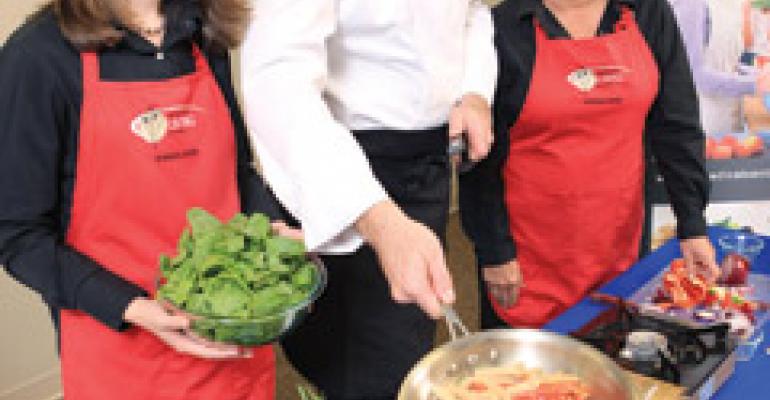NASHUA, N.H. — Millet, and amaranth, and sorghum. Oh my!

That's the reaction of patients sent home with a celiac diagnosis and a list of unfamiliar whole grains that are gluten-free and therefore safe to eat.
Some have trouble pronouncing these grains, never mind working them into their diet, so despite their benefits, a portion cut out all grains to keep things manageable.
That's why St. Joseph's Hospital here is enlisting the help of Hannaford Supermarkets, Scarborough, Maine.
On Feb. 7, the two will host a gluten-free whole grain cooking class at the hospital.
Open to all and free of charge, the class is designed to demystify obscure grains like buckwheat, quinoa, teff and others tolerable to celiac sufferers.
“A lot of patients are asking, ‘How do you cook with different gluten-free grains?’” said Pat Hunter, a registered dietitian and nutrition coordinator for Hannaford's Leominster, Mass. and Nashua, N.H. stores.
Hannaford will donate all foods required for the demo while St. Joseph's will provide the chef, Hunter explained.
Although the menu has not been finalized, Quinoa and Corn Salad, a high-fiber cereal made healthier with ground flax, and Quinoa and Tomato Soup may be among the meals demoed.
As the chef prepares recipes, Hunter will stress the importance of eating a diet that is rich in whole grains. She's hopeful that both components will arm celiac sufferers with the tools necessary to lead a life that's not only healthy, but practical.
“One of the biggest stumbling blocks for most people — who know how to cook with wheat and rice — is that they're not sure what to do with millet, amaranth and sorghum,” she said.
Hunter is one of 22 dietitians in 45 Hannaford stores who facilitates store tours focusing on the specific health needs of the local community. Since the areas she serves have a high concentration of gluten-intolerant shoppers, Hunter hosts gluten-free sampling events, classes and store tours once a month.
During classes, Hunter stresses the importance of keeping a balanced diet. Since options like wheat, barley and rye contain gluten, she presents quick and easy ways to consume alternatives. Teff wraps filled with chicken salad are one fast and tasty way for celiac sufferers to get nutrients.
“Having a gluten-free bread is huge because that's what people with celiac disease miss the most,” Hunter said.
Unfortunately, many also skip the grains that are so crucial to their health since in an effort to avoid gluten-containing grains like wheat, they avoid cereal crops completely.
Hunter explained that a well-balanced diet is important for anyone, but especially for those who cannot tolerate gluten.
“They really need to have a diet that's nutrient rich so the villi returns to normal,” she explained.
Villi are tiny, fingerlike protrusions lining the small intestine that normally allow nutrients to be absorbed into the bloodstream. When a person who cannot tolerate gluten eats wheat, rye, barley, spelt products or other foods containing the protein, the villi is damaged and the person becomes malnourished no matter how much they eat.
Hannaford is not the first grocery retailer to join forces with a hospital to benefit area residents.
Earlier this month, Abingdon, Va.-based K-VA-T's Food City entered into a partnership with the University of Tennessee Medical Center, Knoxville, to bring its Healthy Living Kitchen program to Food City shoppers and associates.
As part of the agreement, a registered dietitian, cardiac nurse specialist and senior executive chef from the UT Medical Center provide healthy cooking classes and information on nutrition and label reading to Food City's shoppers in stores. The retailer, in turn, provides food for demonstrations and prints educational materials, Rhonda McAnally, director of network development and the Healthy Living Kitchen program, told SN. The partnership is also sponsored by a philanthropic gift.
An emphasis is placed on meal preparation, with recipes modified to reduce saturated fats and carbohydrates without sacrificing taste, noted Jane Kelly, the program's cardiac nurse specialist.
“Balsamic-Marinated Asparagus, Butternut Squash Quinoa, Mulled Cider Pork Loin, Key Lime Tartlet and Gingered Mixed Fruit Parfaits are a few examples,” Kelly said.
The five-year-old Healthy Living Kitchen program started out educating cardiovascular disease patients about how to manage their condition with nutrition, but recently branched out to diabetes, celiac disease and kidney disease sufferers. These patients' lifestyles have improved, but there are many more in Tennessee who need help, said McAnally. That's why expanding the program to Food City in particular made great sense.
“Food City stores are conveniently located in the communities with high incidences of obesity, diabetes and cardiovascular disease,” McAnally said.
Indeed, nutrition is lacking throughout Tennessee, which ranks third in the country for diabetes (11%), fourth for adult hypertension (32.1%) and fourth for obesity among adults (30.2%), according to the Robert Wood Johnson Foundation.
In addition to Food City supermarkets, the expanded program is expected to significantly increase the reach of the medical center's educational efforts at schools and community events.
The partnership comes as Food City is helping shoppers help themselves with the at-a-glance NuVal nutritional scoring system.
“Many of the issues that affect our health and wellness are a direct result of our eating habits — good or bad,” said Steve Smith, Food City president and chief executive officer, in a statement. “We feel this program will work hand in hand with our NuVal nutritional scoring system to provide consumers with the added insight necessary to make more informed choices.”





